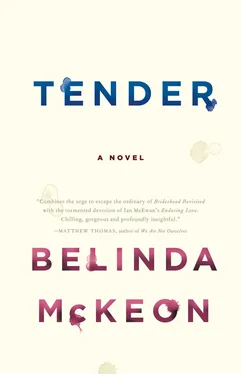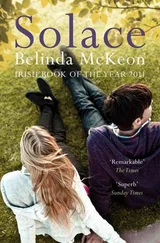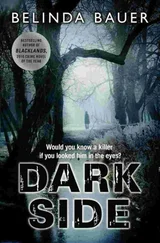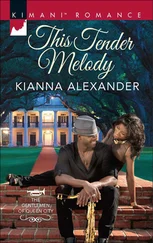“Oh, yeah,” James said casually. “Nate told me about it. He said the three of us can walk there together, quite soon actually, because he and Ed are staying with Michael and Julia, and he has to make a call to New York before the working day ends there.”
“Oh, OK,” Catherine said, feeling robbed of her prize now. “Or we could go back to the Stag’s for a few drinks before heading up there? I don’t want to be the first people to arrive again.”
“No, no,” James said, waving this suggestion away. “We’ll walk up with Nate. It’ll be grand.”
The Doonan mews was off Harcourt Street. It looked small from outside, but inside it immediately opened up into two levels: an elegant hall gave way to a huge central room with a ceiling two stories high; the upstairs floor was a mezzanine, with some rooms closed off behind doors and one whole side given over to what looked like another open space. The walls were hung with art — Catherine recognized a Brian Bourke in the main room, a sharp-boned woman with blacked-out eyes, and a piece in gold and linen that could only be a Scott — and though the night was not cold, a fire burned in the high stone hearth. She, James and Nate were indeed the first arrivals; the Doonans, Dunne and a slew of others had been still taking their leave of the gallery when the three of them had slipped away, Nate teasing them, calling them “the terrible two,” and slipping his arm into James’s other arm in an imitation of how Catherine was linking with him. Here, the front door had been opened by a girl in a black-and-white waitress’s uniform, and others, dressed in the same way, were busy setting up long tables with dozens of glasses and bottles of wine. From a kitchen at the other end of the house, there came a spicy, delicious smell.
“Nice, isn’t it?” Nate said, as Catherine and James stood in the entryway, gawking. “I’m just going up to make this call. Make yourselves at home.” He glanced back imperiously. “Within reason.”
“Ha,” James deadpanned. But as soon as Nate had disappeared upstairs, he turned to Catherine, his eyes wide, his mouth open with amazement. “Fucking hell,” he said. “Where are we?”
“I know.” Catherine shook her head. “It’s amazing.”
“ Imagine, Catherine,” he said, and he went over to a long white leather sofa and sat down. “Imagine living like this.” He patted the seat beside him. “Home sweet home, darling,” he said, and he laughed.
One of the uniformed girls came over to them, smiling, her hands behind her back. “Can I offer you a drink?” she said.
“Oh, Jesus,” James groaned. “We’re in heaven, Catherine.” He looked at the waitress. “Is there any way you can barricade the door?”
She laughed. “I don’t know about that,” she said, looking at them uncertainly; she was around their age.
“Ah, try, though,” James said, mock pleadingly. “Won’t you? We’re just going to have a quiet night in. Myself and the little woman here.”
“Eejit,” said Catherine, through waves of longing and confusion, and as they heard the rattle of the front door, she asked the waitress for a glass of red wine.
Very quickly, the house was full, and James had once again vanished into the fray; he had gone looking for the bathroom ten minutes previously, and had not come back, but Catherine was too concerned with trying not to look lost and pathetic to think about how angry she was with him. At first she drifted around the edges of the big sitting room, looking very closely at the paintings, studying them as though she was thinking of making a purchase; as well as the Bourke and the Scott, there was a McSweeney bog pool that she loved, and a little drawing that she could not identify, but she thought it might possibly be an early Jack Yeats.
“Oh, probably,” said the first person to whom she got talking, a woman in a flowing, peasant-style dress, with very long black hair; the woman had been standing alone at the mantelpiece, surveying the room, and Catherine, taking a deep breath and knowing that she had to take this chance to have a conversation, any conversation, had gone up to her. She was the journalist who had written the Irish Times piece, it turned out, and she had many long, dreary pearls of wisdom for Catherine about avoiding the nightmare that was a career in journalism. A man from the Abbey Theatre came up to talk to the journalist, and in that way Catherine got talking, for a while, to him, and a man who taught English at UCD came up to interrupt their conversation, and after a minute the Abbey man made his excuses and slipped away, and so Catherine was left with the lecturer, which was another fifteen minutes of talking to someone, and even though what he was saying to her was mainly unasked-for advice, Catherine did not mind, because talking to him, or being talked at by him, was preferable to standing around on her own again, and after him there was an actor she had never heard of, and after him a woman who had just finished a book about Michael Doonan’s books, so Catherine was able to talk to her for a long while, drawing on all the research she had found herself unable to use in the actual interview with him; then there was the man from the Abbey again, a little more tipsy and flirtatious now; then there was a young guy who wrote for The Independent, and who was actually quite cute, which reminded her to go and look for James, and by this time she had had two more glasses of champagne and maybe three glasses of wine, and talking to people was, by now, easy, talking to people was, by now, just, for heaven’s sake, what you did, and when she turned around next, David Norris was standing behind her, the actual David Norris, and she got into a conversation with him about American poetry, and he quoted at her a couple of lines from a poem he loved— Shoot, if you must, this old gray head / But spare your country’s flag —and she nodded, as though she knew of the poem, as though she had heard of it, and he smiled back, as though they did not both know she was lying, and Catherine was feeling delighted with herself, feeling she had discovered, at long last, the secret of being a grown-up, and she had seen several other people she wanted to talk to — the Doonans, for one thing, and she had spotted one of her English lecturers — when she found herself standing face to face with Nate. You look like one of the Kennedys, she had an impulse to say to him, but she managed to restrain herself. Nate, meanwhile, holding a tumbler of whiskey, seemed, for some reason, delighted to see her.
“Where have you been all night? Your sidekick and I are in the kitchen.”
“James?”
“James,” he confirmed, taking a mouthful of whiskey. “That guy can talk. What’s that thing?” He frowned. “That you Irish kiss?”
“We kiss?” Catherine said, thinking that she had misheard him.
“The stone,” Nate said. “The stone…” He arched his head dramatically backwards, staggering a little, the tumbler jerking in his hand.
“Oh! The Blarney Stone,” Catherine said, and then shook her head quickly. “Irish people don’t kiss that. Just tourists.”
Nate burst out laughing. “Whatever. Your friend James must give head to the Blarney Stone every morning. He doesn’t shut up!”
“Yeah. He’s never short of something to say.”
“And you’re the quiet one,” Nate said, skeptically.
“Well, compared to him.”
“Where’s your drink?” Just at that moment, a waitress passed with a tray, and he grabbed a bottle and poured a dark torrent of wine into Catherine’s glass. He pointed to a couch which had just come free. “Take a load off?”
He sat, giving a loud sigh of relief as his limbs sank into the leather cushions, and then he went still, suddenly, and frowned. “Oh, that’s bad.”
Читать дальше












